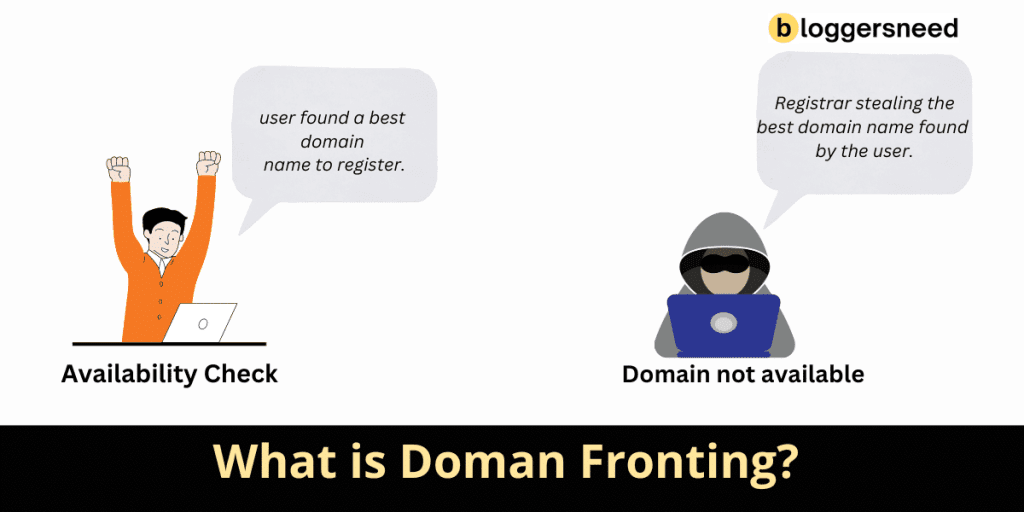
Domain registrars have been accused of stealing domain names through a practice known as domain name front running. This involves registering domains searched by users and selling them at inflated prices, leading to higher costs and reduced access to desired domains.
To avoid domain name front running, users can employ the following techniques.
- Use Neutral WHOIS Services: Utilize neutral WHOIS services like whois.com or ICANN’s lookup to avoid biased results that might be influenced by registrars.
- Immediate Registration: Register domains immediately after finding availability to minimize the window of opportunity for front running.
- Familiarize Yourself with ICANN Regulations: Understand that ICANN prohibits front running and document your experiences if you suspect domain theft.
Table of Contents
What Is Domain Name Front Running?
Domain name front running involves a practice whereby a registrar registers a domain you searched for and then sells it to you at a higher price. You may end up paying much more than the standard registration fee if the registrar steps in before you register the domain.
Fundamentally, domain front running is similar to front running in the stock market, where insider knowledge is used to make profits. This practice can lead to higher costs for you, making it harder to get the domain names you want.
What Is an Example of a Domain Fronting?
An example of domain front running is when a registrar registers an available domain name after a user searches for it, taking advantage of insider knowledge to resell the domain at a higher price.

For instance, imagine searching for a domain name on a registrar’s website, only to come back later and find it unavailable with a ‘For Sale’ sign attached, and the registrar asking for a high price. This might make you feel uneasy, as if the registrar took advantage of your desire to obtain the domain name.
To avoid becoming a victim of domain name front running, register the domain names immediately after searching. It’s also recommended to use reputable registrars, like well-known brands, that don’t engage in this practice.
According to ICANN’s report, 60% of users have fallen victim to this tactic, resulting in higher costs and limited access to the desired domain names.
What Are the Risks for Domain Buyers from Domain Name Front Running?
While searching for domain names, you might encounter domain name front running, where registrars secretly register the names you investigate.
This can lead to emotional and financial impacts, such as the loss of your desired domain name and the indignation of being charged inflated prices.
Understanding the risks and consequences of front running is essential to protect yourself as a domain buyer.
Is There Any Benefit from Domain Name Front Running?
Domain name front running yields financial benefits by exploiting insider information, which can inflate domain prices and limit availability.
For example, a registrar may register a desirable domain name and then offer it for sale at a significant markup, such as elevating standard registration fees from $10 to $100 or more.
How to Avoid Domain Name Front Running?
To avoid domain name front running, use neutral WHOIS services like Google Domains or Internic for domain searches, and always register desired domains as soon as you find them available. This prevents registrars from mining your searches for valuable names.
Instead, opt for third-party lookup tools that prioritize user privacy, such as the command-line whois tool on a Linux system, which queries the relevant WHOIS servers directly.
Once you identify an available domain, register it immediately to prevent front runners from snatching it. Additionally, refrain from discussing your target names in public forums or online discussions where they might be overheard, ensuring your targeted names remain confidential.
It’s also advisable to use reputable registrars like Namecheap, Hostinger, or GoDaddy, as they typically don’t engage in front running due to its negative reputation in the industry.
What Are Icann’s Rules Against Front Running?
When your domain name is stolen by a registrar, you can take action by complaining to ICANN.
The ICANN organization has regulations in place to prevent front running, which involves registrars illegally scooping up domain names for personal gain.
ICANN may place money penalties on registrars that break its rules. These penalties aim to stop bad behavior and make sure the rules are followed.
Suspension or Ending: ICANN can pause or end a registrar’s approval if it breaks its rules badly. This would stop the registrar from working or signing up new names.
How Do You Complain to Icann if Your Domain Name Is Stolen by a Registrar?
If you suspect that your domain name has been stolen by a registrar, you need to know how to complain to ICANN.
To initiate a complaint with ICANN. Use this link to get the complaint form: ICANN Complaint Form. ICANN will check your complaint and may reach out to the registrar for more investigation.
Is There Any Proof of Domain Name Front Running?
In 2008, Network Solutions reportedly used data from WHOIS searches to register domains that users wanted to check. This raised big concerns about whether this practice was right. However, Network Solutions said it was a way to protect their customers.
In 2009, a researcher named Benjamin Edelman did more than 600 tests on 200 site names for registrations. He found no cases of front running. This shows how hard it is to find clear evidence.
Additionally, there are rule additions specifically intended to curtail this misconduct, such as ICANN’s 2013 regulations that squarely outlaw front running.
Does GoDaddy Front Run?
GoDaddy doesn’t engage in front running practices. Multiple factors contribute to the uncertainty surrounding domain availability.
ICANN regulates domain registration, explicitly prohibiting front running. Suspicious activities can be reported to ICANN’s complaints office, which ensures registrars comply with contractual obligations.
Among these incidents, users have reported incorrect availability status, often due to issues with the registrar’s data or connections to their sales network. This can lead to disputes, which can be resolved through ICANN’s Contractual Compliance Program.
Is It Safe to Check Domain Availability?
Checking domain availability through a registrar can sometimes raise concerns about front running, but ICANN regulations and monitoring mechanisms help guarantee it’s generally safe.
For instance, ICANN requires domain registrars to delete registrations after a second notice and a grace period unless there are specific extenuating circumstances.
If you suspect front running, you can submit a complaint to ICANN, specifying the domain and providing evidence of the suspicious activity.
ICANN investigates and enforces contractual compliance, ensuring accountability among registrars.
Which Domain Registrars Are Considered the Most Trustworthy?
When picking a domain registrar to prevent domain name front running, it is essential to choose one that is trusted. Consider buying domains from the top domain registrars, such as Namecheap, Hostinger, and GoDaddy, to ensure a secure registration process.
- Namecheap: Namecheap is a well-known choice because it offers domain at good prices. It also offers free WHOIS privacy, which helps keep your information safe.
- Hostinger: It is a great option, especially for beginners. It provides a complete solution. This includes domain registration and hosting services. You also get free domain and WHOIS privacy help.
- GoDaddy: It is one of the most well-known registrars. It is recognized for its good security features. While it might cost a bit more, it provides basic domain protection. This helps keep your domain safe from name theft.
Affiliate Disclosure: Some of the links in this post are affiliate links, which means I may earn a small commission if you make a purchase through those links. This comes at no extra cost to you. Thank you for your support!
